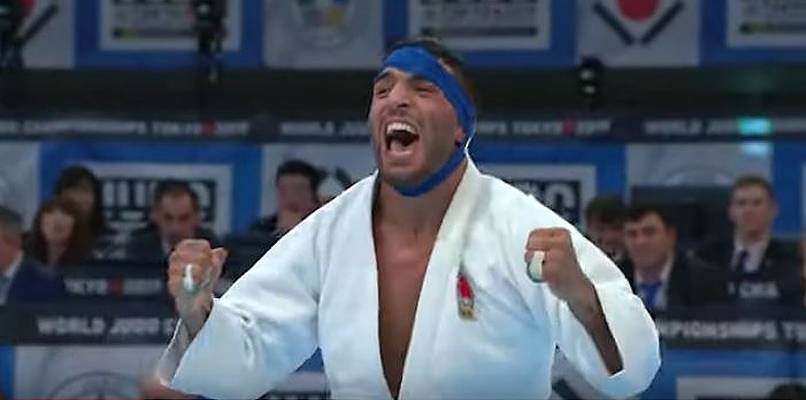The Iranian judoka defected to Germany to seek a life of freedom and escape his nation’s ban on competing against Israelis.
By United with Israel Staff
While Iranian Saeid Mollaei won the World Judo Championship in 2018, he fled his homeland a year later and received “recognized refugee” status from Germany on November 1. This was granted following his secret escape to the country from Tokyo during the 2019 World Championship in August after he was forced to throw his matches to avoid facing Israeli opponent Sagi Muki.
At the time, Mollaei’s coach received two calls from Iranian authorities instructing him to throw his semi-final match in order to avoid meeting Muki, who went on to win the gold medal in the final. Mollaei, 27, bravely ignored the warnings, which potentially could lead to danger for himself and his family in Iran.
He put out a call to for help during an interview with the International Judo Federation (IJF).
“I need help,” Mollaei said during the interview. “Even if the authorities of my country told me that I can go back without any problems, I am afraid. I am afraid of what might happen to my family and to myself. Today, the National Olympic Committee of Iran and the Sport Minister told me to not compete, that I had to comply with the law.”
Mollaei said that he cried when he heard the mandate and wanted to defend the gold medal that he won in the 81-kilogram weight class at the 2018 World Championships in Azerbaijan.
“I am a fighter. I want to compete wherever I can,” he said. “I live in a country whose law does not permit me to. We have no choice, all athletes must comply with it. All I did today was for my life, for a new life.”
“I could have been the world champion,” noted Mollaei. “I’ve been training hard, making lots of efforts. Today, I fought and won against an Olympic champion, an Olympics bronze medalist and other opponents. I beat all of them. I even dreamed of the championship title today. But that was not my fate. I could not compete because of the law in my country, and because I was scared of consequences for my family and myself.”
Responding to Mollaei’s desperation, International Judo Federation chief Marius Vizer assisted his escape.
Mollaei’s new status allows him to live legally in Germany. He has resumed training with hopes of competing in the 2020 Tokyo Olympics as part of the International Olympic Committee (IOC) Refugee Olympic Team, established in 2015, the International Judo Federation reported. The Tokyo team consists of 37 Refugee Athlete Scholarship-Holders.
Judoka was included in April 2019.
Judo: A Bridge Between People and Cultures
“As many times before, Judo proves to be a bridge between people and cultures, an educational pillar that contributes to a better world,” Vizer said at the announcement. “By taking this historic step, Judo sets an example in the sports world, as part of a project that was recognized and recommended also by the Executive Board of the International Olympic Committee, in the general framework of promoting the Olympic ideals of peace and unity, through one of the main moral principles of Judo: ‘mutual aid and prosperity.’“
Following Muki’s gold medal win, which was the first ever for Israel’s male judo fighters in a world championship, Mollaei congratulated the Israeli champion in an extraordinary Instagram exchange.
“Congratulation champion,” Mollaei replied to an Instagram post by Muki that included emojis of a gold medal and a championship cup.
“Thank you,” Muki responded. “You are an inspiration as a human being and as an athlete.”
Mollaei in a live interview on his Instagram page in September, “I hope to meet [Muki] on the tatami mat as soon as possible and establish a friendship between two great athletes,” he said. “He is a true champion and he deserved to win the World Championships. He had a perfect match-day and he deserves to be number one.”
Reiterating these sentiments in an interview with DW, Germany’s international broadcaster, Mollaei said, “I am friends with Sagi Muki, as I am with all other athletes. He supports me and I thank him for this. I hope that we can one day extend our friendship to the tatami mat. It doesn’t matter who wins, what matters is friendship.”
The Olympic Charter states under Fundamental Principle 4, “Every individual must have the possibility of practicing sport, without discrimination of any kind and in the Olympic spirit, which requires mutual understanding with a spirit of friendship, solidarity and fair play.”
The International Judo Federation indefinitely banned Iran from competing following this incident.
